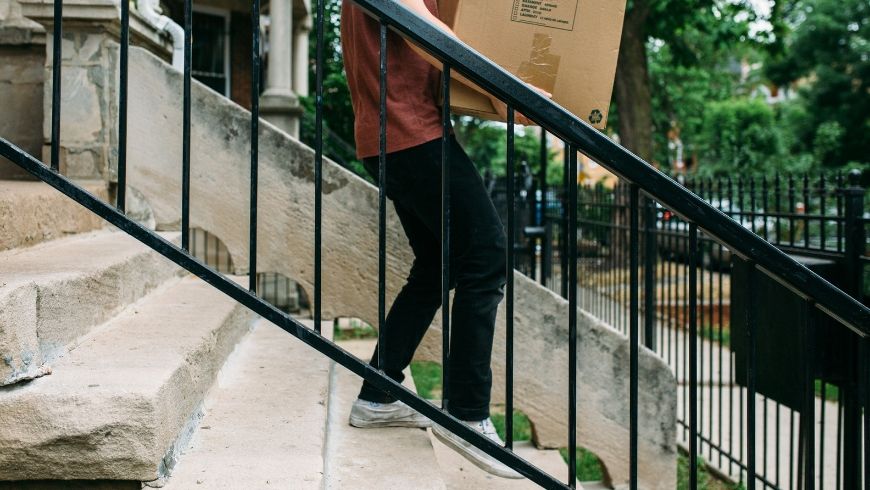Over the next two months, you’ll hear the collective sighs of parents around the country saying goodbye to their college bound students. You may also hear a few whoops and hollers from the students as their parents drive away!
This is a major milestone for parents and students. As parents, we are excited for our children and the road ahead, but it also signals the end of an era for us. For students, it means newfound freedom and the beginning of an amazing journey. While most won’t admit it, they probably are a bit anxious about leaving the security of home, as well as the free laundry services and clean bathrooms.
So imagine combining all of your emotional baggage with plastic bins, luggage, and small appliances. Now add in traffic, minimal parking, August weather, and if you’re lucky two elevators – that is college move-in day! Don’t worry. With the right frame of mind and a little preparation, you’ll get through it just fine. Here are few tips from Residence Hall experts and parents that have survived the freshmen day move in!
BEFORE YOU GO
If your child is like mine and hasn’t looked at any of the literature about move-in day, then enjoy taking charge one last time! Go to the university’s residence life website where you can find all the details about move-in day.
“We encourage students first to take a look at the “Move-In Checklist” and our “Policies and Procedures” on our website,” says Dr. Ann Bailey, Director of Housing for Mississippi State University. “This list not only includes a list of items students may need, but also includes items that are not allowed in our residence halls.”
University of Pittsburgh’s “Arrival Survival” details everything from before you leave home to after you’ve moved in. They even have a Twitter handle just for the big event. Residence Housing websites provide information about each residence hall, including what basic items come with the room. Some schools provide or rent the mini-fridge and microwave. Note that many rooms use extra long mattresses – meaning your sheets from home may not fit! You can also get measurements to determine if there’s space for additional items like beanbag chairs, extra storage units, etc. You don’t want to waste time and money buying and packing items that may never be used.
DON’T BOTHER PACKING THESE:
Leave things like heaters, toasters, hotplates, Panini presses, rope lights, wireless routers, and halogen lights at home. “Anything with open heat sources aren’t allowed due to fire hazards,” says Samantha Noblit, residence director for the University of Pittsburgh. “Halogen light bulbs are typically not allowed as they can get very hot and start fires.”
Once you’ve figured what your student needs, make a list of items they use at home – toiletries, kitchen supplies, laundry, etc. This will give them an idea of what they will need to bring and determine how to store it.
IT’S THE LITTLE THINGS
Don’t forget miscellaneous things like a garbage can, hangers, and a first aid kit. Shower curtains and tension rods come in handy for additional privacy in suite-style bathrooms. Anne Garraway, a mom with students at Mississippi State, says to consider purchasing a good mattress pad/foam pad to make the bed more comfortable, as well as a little fan in case roommates don’t agree on temperature.
According to Noblit, shower caddies and flip-flops are some of the most used items. “Communal showers are an adjustment for students, but shower caddies allow them to put all of their toiletry items in one easy transportable basket.”
Noblit also suggests students bring pictures, decorations, or anything else that can make their room feel more like home. She advises bringing an alarm clock even though many students use cellular devices for this purpose. “Sometimes batteries die in the middle of the night and parents aren’t knocking on their door!”
Consider waiting a few weeks on items like an iron. “Many times, one student on the floor will have them and they can share with others,” advises Noblit. She also says televisions and printers are on the decline, especially with the rise of streaming television sites and the fact that more professors are accepting assignments via email or other online systems. Most residence halls have student lounges with TVs for public use.
TALK BEFORE YOU BUY
Michele White, a mother of three college graduates advises students to talk to their roommate(s) before they purchase anything. Decide beforehand what common items they will each contribute. “You don’t want two refrigerators and two TVs,” adds White.
SHOULD YOU BUY HERE OR THERE?
Some parents suggest buying supplies in your hometown before you go. “It can be difficult to shop in college towns,” says Garraway. “They run out of everything on move-in weekend.”
However, if you want the full experience, a trip to the university’s local Wal-Mart or Target with everyone else on move-in day can be a fun and memorable event! Another option is to purchase items at big box stores online or in your home state and then have them delivered to the local store near the university.
GET PACKING
It’s important to have everything in manageable bins, suitcases, etc. Miscellaneous grocery bags of items are sure to rip, or fall over emptying your nice clean linens on the ground.
“Label all of your personal belongings with your first and last name, and room number (include wing/floor, if applicable), and only bring essentials on that first day,” recommends Bailey. “Then, be aware for the next few days of items you want/have room for, and either take a trip home or go to a local store to purchase them.”
“There is no use in packing a bunch of oversized winter coats if you are coming home in a month,” says Noblit. “There isn’t a lot of storage in your residence hall room, so being mindful of the seasons will be important in fitting everything.”
CHECKING IN
Move-in day is usually staggered by dorms, floors, etc., to ease traffic and parking. When you get there, your student will check in to receive his dorm keys. Once we pulled up to my son’s residence hall, there were at least four volunteers ready to take his belongings straight to his room. The van was unloaded within minutes. His residence hall did not have elevators, so we were extremely appreciative of the help to the third floor! Even if your student’s residence hall does have elevators, expect a wait or use the time to get your cardio by taking the stairs!
SAYING GOODBYE
Once you’re all moved in, schools may have complimentary refreshments. LSU offered banana splits – encouraging parents to “split!” MS State had a “Blues Breakfast” the morning after move-in.
Gwen House Hymel, a mother of three college graduates, advises that you make the goodbyes short and quick. “I did it and had a good cry on the way home. My kids said I took it well and they weren’t worried about me! It made them feel better about moving on.”
For Hymel each goodbye was different. With one, they agreed to just say “see ya soon!” With another, the best farewell was a long hug and a few words of encouragement. Her youngest just gave her a kiss on the cheek and told her he would be fine.
“We encourage families to say ‘see you later,’” adds Bailey. Noblit said the best way to say goodbye is to hug your child, tell them you love them, make a plan for communication, and a plan for their next visit home. “Making a plan for their next visit home puts a slight moratorium on “empty nest syndrome” and gives each of you something to look forward to.”
We want to hear about your move-in day experience. Make sure to post pictures on our Facebook page!
Since 2007, NobleHour has proven to be the volunteer management solution for organizations across the nation. With its robust online platform, NobleHour enhances community engagement with a variety of innovative and transformative tools for finding, tracking, and measuring volunteer, service‐learning, and community service initiatives. With offices in Lakeland, FL, and Portland, OR, the NobleHour team is dedicated to empowering good in communities across the country.
By NobleHour Special Contributor:

Dolly Duplantier
Consultant, NobleHour
Contributing Writer / Blogger
Public Relations and Communications
Greater Chicago Area
Dolly Duplantier is a freelance writer, editor, and social media specialist. She is the mother of three children, one college graduate, one in college, and one in high school. Writing about people and organizations making a difference is one of the best aspects of her job!
